
Tazio Giorgio Nuvolari was an Italian racing driver. He first raced motorcycles and then concentrated on sports cars and single-seaters. A resident of Mantua, he was known as Il Mantovano Volante and nicknamed "Nivola". His victories—72 major races, 150 in all—included 24 Grands Prix, five Coppa Cianos, two Mille Miglias, two Targa Florios, two RAC Tourist Trophies, a Le Mans 24-hour race, and a European Championship in Grand Prix racing. Ferdinand Porsche called him "the greatest driver of the past, the present, and the future".

The British Grand Prix is a Grand Prix motor race organised in the United Kingdom by the Royal Automobile Club. First held in 1926, the British Grand Prix has been held annually since 1948 and has been a round of the FIA Formula One World Championship every year since 1950. In 1952, following the transfer of the lease of the Silverstone Circuit to the British Racing Drivers' Club, the RAC delegated the organisation of the race to the BRDC for the first time, and this arrangement has continued for all British Grands Prix held at Silverstone since then.
Grand Prix motor racing, a form of motorsport competition, has its roots in organised automobile racing that began in France as early as 1894. It quickly evolved from simple road races from one town to the next, to endurance tests for car and driver. Innovation and the drive of competition soon saw speeds exceeding 100 miles per hour (160 km/h), but because early races took place on open roads, accidents occurred frequently, resulting in deaths both of drivers and of spectators. A common abbreviation used for Grand Prix racing is "GP" or "GP racing".

The Swiss Grand Prix, was the premier auto race of Switzerland. In its later years it was a Formula One race.
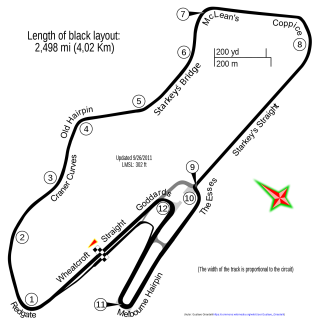
Donington Park is a motorsport circuit located near Castle Donington in Leicestershire, England. The circuit business is now owned by Jonathan Palmer's MotorSport Vision organisation, and the surrounding Donington Park Estate, still owned by the Wheatcroft family, is currently under lease by MotorSport Vision until 2038. It has a capacity of 120,000, and is also the venue of the Download Festival.

The Spanish Grand Prix is a Formula One motor racing event currently held at the Circuit de Barcelona-Catalunya. The race is one of the oldest in the world still contested, celebrating its centenary in 2013. The race had modest beginnings as a production car race. Interrupted by the First World War, the race waited a decade for its second running before becoming a staple of the European calendar. In 1927 it was part of the World Manufacturers' Championship; it was promoted to the European Championship in 1935 before the Spanish Civil War brought an end to racing. The race was successfully revived in 1967 and has been a regular part of the Formula One World Championship since 1968 at a variety of venues.

Road racing is a form of motorsport racing held on a paved road surface. The races can be held either on a closed circuit or on a street circuit utilizing temporarily closed public roads. Originally, road races were held almost entirely on public roads. However, public safety concerns eventually led to most races being held on purpose-built racing circuits.
Frederick Roberts Gerard was a racing driver and businessman from England. He participated in numerous top-level motor racing events on either side of World War II, including eight World Championship Formula One Grands Prix, scoring no championship points.
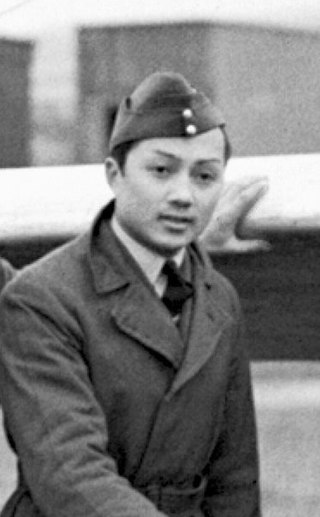
Prince Birabongse Bhanudej Bhanubandh, better known as Prince Bira of Siam or by his nom de courseB. Bira, was a member of the Thai royal family, racing driver, sailor, and pilot.

Richard John Beattie Seaman was a British Grand Prix racing driver. He drove for the Mercedes-Benz team from 1937 to 1939 in the Mercedes-Benz W125 and W154 cars, winning the 1938 German Grand Prix. He died of his injuries after his car overturned at the 1939 Belgian Grand Prix.

Patrick Peter Mitchell-Thomson, 2nd Baron Selsdon won the 1949 24 Hours of Le Mans together with Luigi Chinetti in a Ferrari 166 MM.

The Phillip Island Grand Prix Circuit is a motor racing circuit located near Ventnor, on Phillip Island, Victoria, Australia. The current circuit was first used in 1956.
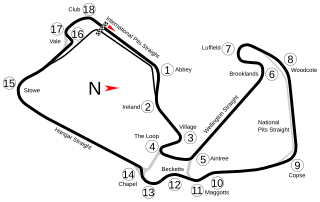
The British motorcycle Grand Prix is a motorcycling event that is part of the Grand Prix motorcycle racing season.
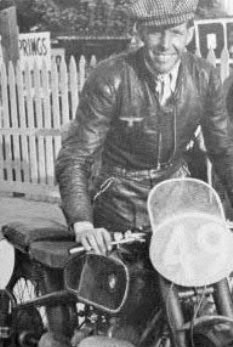
Georg "Schorsch" Meier was a German motorcycle racer famous for being the first foreign winner of the prestigious Senior TT, the Blue Riband race of the Isle of Man TT Races, in 1939 riding for the factory BMW team and the first motorcycle racer to lap a Grand Prix course at over 100 mph.

The RAC Tourist Trophy is a motor racing award presented by the Royal Automobile Club (RAC) to the overall victor of a motor race in the United Kingdom. Established in 1905, it is the world's oldest automobile race. The 18-carat gold trophy is based on Giambologna's sculpture of the Greek god Hermes. Series to have featured the trophy include the World Sportscar Championship, the FIA GT Cup, the World Touring Car Championship, the European Touring Car Championship, the FIA GT Championship, the British Touring Car Championship, the FIA GT1 World Championship, and the overall winners of the British GT Championship in the 1999, 2000, 2003 and 2004 seasons. It has been presented to the overall winners of the Silverstone Circuit round of the FIA World Endurance Championship from 2013 on.

Frederick Bernard "Tom" Wheatcroft was an English businessman and car collector. He made his fortune through building and construction, and was known for resurrecting the Donington Park motor racing circuit and founding the Donington Grand Prix Collection museum.

The Auto Union Grand Prix racing cars types A to D were developed and built by a specialist racing department of Auto Union's Horch works in Zwickau, Germany, between 1933 and 1939, after the company bought a design by Dr. Ferdinand Porsche in 1933.

Opatija Circuit, also known as Preluk Circuit and the Kvarner Circuit, was a motorsport street circuit in Opatija, Croatia. The circuit used the city streets of the seaside resort situated on the Kvarner Gulf between 1931 and 1977. It was known as the "Monaco" of the Grand Prix motorcycle racing circuit because of its dramatic views of the Adriatic Sea.
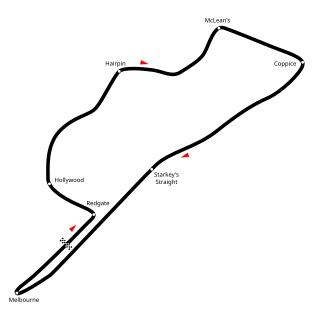
The 1938 Donington Grand Prix was a Grand Prix motor race held on 22 October 1938 over 80 laps of the Donington Park circuit. The race was won by Tazio Nuvolari driving an Auto Union.

The 1935 Donington Grand Prix was a non-championship Grand Prix that was held on 2 October 1935 at Donington Park in North West Leicestershire, England. It was the 39th race of the 1935 Grand Prix season. The race, which was 120 laps, was won by Richard Shuttleworth driving a Alfa Romeo Tipo-B "P3" after starting from 7th place.

















